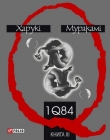
Текст книги "1q84"
Автор книги: Haruki Murakami
Жанр:
Современная проза
сообщить о нарушении
Текущая страница: 36 (всего у книги 81 страниц)
His father went on staring at Tengo with expressionless eyes, saying nothing, but Tengo felt he might be seeing the tiniest gleam of light flashing somewhere deep within those empty swallows’ nests.
“I am nothing,” Tengo said. “You are right. I’m like someone who’s been thrown into the ocean at night, floating all alone. I reach out, but no one is there. I call out, but no one answers. I have no connection to anything. The closest thing I have to a family is you, but you hold on to the secret and won’t even try to tell me anything. Meanwhile, in this seaside town, your memory goes through repeated ups and downs as it steadily deteriorates day by day. Like your memory, the truth about me is being lost. Without the aid of truth, I am nothing, and I can never be anything. You are right about that, too.”
“Knowledge is a precious social asset,” his father said in a monotone, though his voice was somewhat quieter than before, as if someone behind him had reached over and turned down the volume. “It is an asset that must be amassed in abundant stockpiles and utilized with the utmost care. It must be handed down to the next generation in fruitful forms. For that reason, too, NHK needs to have all of your subscription fees and—”
This is a kind of mantra for him, thought Tengo. He has protected himself all these years by reciting such phrases. Tengo felt he had to smash this obstinate amulet of his, to pull the living human being out from behind the surrounding barrier.
He cut his father short. “What kind of person was my mother? Where did she go? What happened to her?”
His father brought his incantation to a sudden halt.
Tengo went on, “I’m tired of living in hatred and resentment. I’m tired of living unable to love anyone. I don’t have a single friend—not one. And, worst of all, I can’t even love myself. Why is that? Why can’t I love myself? It’s because I can’t love anyone else. A person learns how to love himself through the simple acts of loving and being loved by someone else. Do you understand what I am saying? A person who is incapable of loving another cannot properly love himself. No, I’m not blaming you for this. Come to think of it, you may be such a victim. You probably don’t know how to love yourself. Am I wrong about that?”
His father was closed off in silence, lips shut tight. It was impossible to tell from his expression whether he had understood Tengo or not. Tengo also fell silent and settled more deeply into his chair. A breeze blew in through the open window, stirred the sun-bleached curtains and the delicate petals of the potted plant, and slipped through the open door into the corridor. The smell of the sea was stronger than before. The soft sound of pine needles brushing against each other blended with the cries of the cicadas.
His voice softer now, Tengo went on, “A vision often comes to me—the same one, over and over, ever since I can remember. I suspect it’s probably not so much a vision as a memory of something that actually happened. I’m one and a half years old, and my mother is next to me. She and a young man are holding each other. The man is not you. Who he is, I have no idea, but he is definitely not you. I don’t know why, but the scene is permanently burned into me.”
His father said nothing, but his eyes were clearly seeing something else—something not there. The two maintained their silence. Tengo was listening to the suddenly stronger breeze. He did not know what his father was listening to.
“I wonder if I might ask you to read me something,” his father said in formal tones after a long silence. “My sight has deteriorated to the point where I can’t read books anymore. I can’t follow the words on the page for long. That bookcase has some books. Choose any one you like.”
Tengo gave up and left his chair to scan the spines of the volumes in the bookcase. Most of them were historical novels set in ancient times when samurai roamed the land. All the volumes of Sword of Doom were there. Tengo couldn’t bring himself to read his father some musty old book full of archaic language.
“If you don’t mind, I’d rather read a story about a town of cats,” Tengo said. “I brought it to read myself.”
“A story about a town of cats,” his father said, savoring the words. “Please read that to me, if it is not too much trouble.”
Tengo looked at his watch. “It’s no trouble at all. I have plenty of time before my train leaves. It’s an odd story; I don’t know if you’ll like it or not.”
Tengo pulled out his paperback and started reading “Town of Cats.” His father listened to him read the entire story, not changing his position in the chair by the window. Tengo read slowly in a clearly audible voice, taking two or three breaks along the way to catch his breath. He glanced at his father whenever he stopped reading but saw no discernible reaction on his face. Was he enjoying the story or not? He could not tell. When he was through reading the story, his father was sitting perfectly still with his eyes closed. He looked as if he could be sound asleep, but he was not. He was simply deep inside the story, and it took him a while to come back out. Tengo waited patiently for that to happen. The afternoon light had begun to weaken and blend with touches of evening. The ocean breeze continued to shake the pines.
“Does that town of cats have television?” his father asked.
“The story was written in Germany in the 1930s. They didn’t have television yet back then. They did have radio, though.”
“I was in Manchuria, but I didn’t even have a radio. There weren’t any stations. The newspaper often didn’t arrive, and when it did it was two weeks old. There was hardly anything to eat, and we had no women. Sometimes there were wolves roaming around. It was like the edge of the earth out there.”
He fell silent for a while, thinking, probably recalling the hard life he led as a young pioneer in distant Manchuria. But those memories soon clouded over, swallowed up into nothingness. Tengo could read these movements of his father’s mind from the changing expressions on his face.
“Did the cats build the town? Or did people build it a long time ago and the cats came to live there?” his father asked, speaking toward the windowpane as if to himself, though the question seemed to have been directed to Tengo.
“I don’t know,” Tengo said. “But it does seem to have been built by human beings long before. Maybe the people left for some reason—say, they all died in an epidemic—and the cats came to live there.”
His father nodded. “When a vacuum forms, something has to come along to fill it. Because that’s what everybody does.”
“That’s what everybody does?”
“Exactly.”
“What kind of vacuum are you filling?”
His father scowled. His long eyebrows came down to hide his eyes. Then he said with a touch of sarcasm in his voice, “Don’t you know?”
“I don’t know,” Tengo said.
His father’s nostrils flared. One eyebrow rose slightly. This was the expression he always used when he was dissatisfied with something. “If you can’t understand it without an explanation, you can’t understand it with an explanation.”
Tengo narrowed his eyes, trying to read the man’s expression. Never once had his father employed such odd, suggestive language. He always spoke in concrete, practical terms. To say only what was necessary when necessary: that was his unshakable definition of a conversation. But there was no expression on his face to be read.
“I see. So you are filling in some kind of vacuum,” Tengo said. “All right, then, who is going to fill the vacuum that you have left behind?”
“You,” his father declared, raising an index finger and thrusting it straight at Tengo. “Isn’t it obvious? I have been filling in the vacuum that somebody else made, so you will fill in the vacuum that I have made. Like taking turns.”
“The way the cats filled in the town after the people were gone.”
“Right. Lost like the town,” his father said. Then he stared vacantly at his own outstretched index finger as if looking at some mysterious, misplaced object.
“Lost like the town,” Tengo repeated his father’s words.
“The woman who gave birth to you is not anywhere anymore.”
“ ‘Not anywhere.’ ‘Lost like the town.’ Are you saying she’s dead?”
His father made no reply to that.
Tengo sighed. “So, then, who is my father?”
“Just a vacuum. Your mother joined her body with a vacuum and gave birth to you. I filled in that vacuum.”
Having said that much, his father closed his eyes and closed his mouth.
“Joined her body with a vacuum?”
“Yes.”
“And you raised me. Is that what you’re saying?”
After one ceremonious clearing of his throat, his father said, as if trying to explain a simple truth to a slow-witted child, “That is why I said, ‘If you can’t understand it without an explanation, you can’t understand it with an explanation.’ ”
“So you’re telling me that I came out of a vacuum?” Tengo asked.
No answer.
Tengo folded his hands in his lap and looked straight into his father’s face once more. This man is no empty shell, no vacant house. He is a flesh-and-blood human being with a narrow, stubborn soul and shadowed memories, surviving in fits and starts on this patch of land by the sea. He has no choice but to coexist with the vacuum that is slowly spreading inside him. The vacuum and his memories are still at odds, but eventually, regardless of his wishes, the vacuum will completely swallow up whatever memories are left. It is just a matter of time. Could the vacuum that he is confronting now be the same vacuum from which I was born?
Tengo thought he might be hearing the distant rumble of the sea mixed with the early-evening breeze slipping through the pine branches. Though it could have been an illusion.
CHAPTER 9
Aomame
WHAT COMES AS A PAYMENT
FOR HEAVENLY GRACE
When Aomame walked into the adjoining room, Buzzcut followed and swiftly closed the door. The room was totally dark. Thick curtains covered the window, and all lights had been extinguished. A few rays of light seeped in through a gap between the curtains, serving only to emphasize the darkness of everything else.
It took time for her eyes to adjust to the darkness, as in a movie theater or planetarium. The first thing she saw was the display of an electric clock on a low table. Its green figures read 7:20 p.m. When a few more seconds passed, she could tell that there was a large bed against the back wall. The clock was near the head of the bed. This room was somewhat smaller than the spacious adjoining room, but it was still larger than an ordinary hotel room.
On the bed was a deep black object, like a small mountain. Still more time had to go by before Aomame could tell that its irregular outline indicated the presence of a human body. During this interval, the outline remained perfectly unbroken. She could detect no signs of life. There was no breathing to be heard. The only sound was the soft rush of air from the air conditioner near the ceiling. Still, the body was not dead. Buzzcut’s actions were based on the premise that this was a living human being.
This was a very large person, most likely a man. She could not be sure, but the person did not seem to be facing in this direction and did not seem to be under the covers but rather was lying facedown on the made-up bed, like a large animal at the back of a cave, trying not to expend its physical energy while it allows its wounds to heal.
“It is time,” Buzzcut announced in the direction of the shadow. There was a new tension in his voice.
Whether or not the man heard Buzzcut’s voice was unclear. The dark mound on the bed remained perfectly still. Buzzcut stood stiffly by the door, waiting. The room was enveloped in a silence so deep Aomame could hear someone swallow, and then she realized that the sound of swallowing had come from her. Gripping her gym bag in her right hand, Aomame, like Buzzcut, was waiting for something to happen. The clock display changed to 7:21, then 7:22, then 7:23.
Eventually the outline on the bed began to show a slight degree of motion—a faint shudder that soon became a clear movement. The person must have been in a deep sleep or a state resembling sleep. The muscles awoke, the upper body began to rise, and, in time, the consciousness was regained. The shadow sat straight up on the bed, legs folded. It’s definitely a man, thought Aomame.
“It is time,” Buzzcut said again.
Aomame heard the man release a long breath. It was like a heavy sigh slowly rising from the bottom of a deep well. Next came the sound of a large inhalation. It was as wild and unsettling as a gale tearing through a forest. Then the cycle started again, the two utterly different types of sound repeated, separated by a long silence. This made Aomame feel uneasy. She sensed that she had found her way into a region that was completely foreign to her—a deep ocean trench, say, or the surface of an unknown asteroid: the kind of place it might be possible to reach with great effort, but from which return was impossible.
Her eyes refused to adapt fully to the darkness. She could now see to a certain point but no farther. All that her eyes could reach was the man’s dark silhouette. She could not tell which way he was facing or what he was looking at. All she could see was that he was an extremely large man and that his shoulders seemed to rise and fall quietly—but enormously—with each breath. This was not normal breathing. Rather, it was breathing that had a special purpose and function and that was performed with the entire body. She pictured the large movements of his shoulder blades and diaphragm expanding and contracting. No ordinary human being could breathe with such fierce intensity. It was a distinctive method of breathing that could only be mastered through long, intense training.
Buzzcut stood next to her at full attention, back straight, chin in. His breathing was shallow and quick, in contrast to that of the man on the bed. He was trying to minimize his presence as he waited for the intense deep breathing sequence to end: apparently it was an activity the man practiced routinely. Like Buzzcut, Aomame could do nothing but wait for it to end. It was probably a process the man needed to go through to become fully awake.
Finally, the special breathing ended in stages, the way a large machine stops running. The intervals between breaths grew gradually longer, concluding with one long breath that seemed to squeeze everything out. A deep silence fell over the room once again.
“It is time,” Buzzcut said a third time.
The man’s head moved slowly. He now seemed to be facing Buzzcut.
“You may leave the room,” the man said. His voice was a deep, clear baritone—decisive and unambiguous. His body had apparently attained complete wakefulness.
Buzzcut gave one shallow bow in the darkness and left the room the way he had entered it, with no unnecessary movements. The door closed, leaving Aomame alone in the room with the man.
“I’m sorry it’s so dark,” the man said, most likely to Aomame.
“I don’t mind,” Aomame said.
“We had to make it dark,” the man said softly. “But don’t worry. You will not be hurt.”
Aomame nodded. Then, recalling that she was in darkness, she said aloud, “I see.” Her voice was somewhat harder and higher than normal.
For a time, the man stared at Aomame in the darkness. She felt herself being stared at intensely. His gaze was precise and attentive to detail. He was not so much “looking” at her as “viewing” her. He seemed able to survey every inch of her body. She felt as if he had, in an instant, stripped off every piece of clothing and left her stark naked. But his gaze didn’t stop with the skin; it pierced through to her muscles and organs and uterus. He can see in the dark, she thought. He is viewing far more than the eyes can see.
“Things can be seen better in the darkness,” he said, as if he had just seen into her mind. “But the longer you spend in the dark, the harder it becomes to return to the world aboveground where the light is. You have to call a stop to it at some point.”
Having said this, he spent another interval observing Aomame. There was nothing sexual in his gaze. He was just viewing her as an object, the way a boat passenger stares at the shape of a passing island. But this was no ordinary passenger. He was trying to see through to everything about the island. With prolonged exposure to such a relentless, piercing gaze, Aomame strongly felt the imperfections of her own fleshly self. This was not how she felt normally. Aside from the size of her breasts, she was, if anything, proud of her body. She trained it daily and kept it beautiful. Her muscles were smooth and taut without the slightest excess flesh. Stared at by this man, however, she could not help but feel that her flesh was a worn-out old bag of meat.
As though he had read her thoughts, the man stopped staring at her. She felt the power suddenly go out of his gaze. It was as if someone had been spraying water with a hose when another person behind the building turned off the spigot.
“Sorry, but could you open the curtains just a bit?” the man asked softly. “I’m sure you could use some light, too, for your work.”
Setting the gym bag on the floor, Aomame went over to the window and pulled on the cords at the side to open, first, the thick, heavy curtains and then the inner white lace curtains. Nighttime Tokyo poured its light into the room. Tokyo Tower’s floodlights, the lamps lining the elevated expressway, the moving headlights of cars, the lighted windows of high-rise buildings, the colorful rooftop neon signs: they all combined to illuminate the hotel room with that mixed light unique to the big city, but just barely, enough so that Aomame was now able to make out some of the room’s furnishings. Aomame saw the light with a pang of familiarity. This was light from the world to which she herself belonged. She suddenly realized how urgently she needed such light. As weak as it was, though, it appeared to be too strong for the man’s eyes. Still seated on the bed in the lotus position, he covered his face with his two large hands.
“Are you all right?” Aomame asked.
“Don’t worry,” he said.
“Shall I close the curtains a bit more?”
“No, that’s fine. I have a problem with my retinas. It takes time for them to adjust to light. I’ll be all right in a minute. Have a seat over there.”
A problem with his retinas? Aomame wondered. People with retinal problems are usually on the verge of going blind. But this was of no concern to Aomame now. She was not here to deal with this man’s sight.
While the man was covering his face with his hands and letting his eyes adjust to the light streaming in from the window, Aomame sat on a sofa and watched him. Now it was her turn to study him in detail.
He was a very large man. Not fat, just large. Tall and broad and powerful looking. She had heard about his large size from the dowager, but she had not expected him to be this big. There was, of course, no reason that a religious guru should not be huge. She imagined ten-year-old girls being raped by this big man and found herself scowling. She imagined him naked and mounted on a tiny girl. There was no way for such girls to resist. Even an adult woman would have a difficult time of it.
The man was wearing something like thin sweatpants that narrowed at the ankles with elastic bands, and a solid-color long-sleeved shirt that had a slight, silk-like sheen. The loose-fitting shirt buttoned up the front, but the man had left the top two buttons open. Both the pants and the shirt appeared to be white or a light cream color. These were not pajamas but more like comfortable lounging clothes or an outfit that would look normal under palm trees in southern lands. His bare feet looked big. The broad stone wall of his shoulders brought to mind an experienced martial arts combatant.
After waiting for a pause in Aomame’s observation, the man said, “Thanks for coming today.”
“It’s my job,” Aomame said in a voice devoid of emotion. “I go where I’m needed.” Even as she spoke, however, she felt like a prostitute who had come when called. Perhaps this was due to the way he had undressed her in the darkness with that penetrating gaze.
“How much do you know about me?” the man asked Aomame, his hands still covering his face.
“How much do I know about you?”
“That’s right.”
“Almost nothing,” Aomame said, choosing her words carefully. “I have not even been told your name. All I know is that you are the head of a religious organization in Nagano or Yamanashi, that you have some kind of physical problem, and that I may be able to help you with it.”
The man gave his head a few quick shakes and took his hands away from his face. Now he and Aomame were looking directly at each other.
His hair was long. His abundant head of hair hung straight down to his shoulders. It had much gray mixed in. The man was probably somewhere in his late forties or early fifties. He had a large nose that occupied a good deal of his face. It was admirably straight and brought to mind a calendar photo of the Alps. The mountain had a broad base and great dignity. It was the first thing one noticed when looking at his face, and it contrasted sharply with his eyes, which were set so deeply into his face that it was hard to tell what they were looking at. Like his body, his face was broad and thick. Clean-shaven, it bore no scars or moles. The features worked well together, producing a look of serenity and intelligence but also something peculiar, out of the ordinary, something that did not inspire easy trust. It was the kind of face that, on first impression, gives people pause. Perhaps it was because the nose was too big. Because of it, the face was missing a certain balance, perhaps the root of what left the observer feeling unsettled. Or perhaps it was the deep-set eyes that did it, the way they gave off the quiet glow of an ancient glacier. Then again, it might have been the cruel impression created by the thin lips, which looked as if they were ready to spit out unpredictable words at any moment.
“And besides that?” he asked.
“Besides that I have heard very little. All I was told was to be prepared to perform stretching exercises. The muscles and joints are my area of expertise. I don’t need to know much about my clients’ positions or personalities.”
Just like a whore, Aomame thought.
“I understand what you are saying,” the man said in a deep voice. “But in my case, you might need some explanation.”
“I would be glad to listen to anything you might wish to share.”
“People call me ‘Leader.’ But I almost never show my face to anyone. Most of our believers, although they belong to the religion and live in the same compound, have no idea what I look like.”
Aomame nodded.
“But here I am, letting you see my face. For one thing, I can hardly ask you to treat me in the dark or blindfolded. And there is also the question of courtesy”
“What I do is not a ‘treatment,’ ” Aomame calmly corrected him. “It is simply the stretching of the muscles. I am not licensed to perform medical procedures. All I do is force people to stretch the muscles they don’t normally use or the ones that are difficult to use, and that way we prevent the deterioration of their physical strength.”
The man appeared to smile faintly, though it might have been a mere illusion caused by a slight twitching of his facial muscles.
“I am quite aware of that. I simply used the word ‘treat’ for convenience’s sake. Don’t worry. All I was trying to say was that you are now seeing something that most people are not able to see, and I wanted you to be aware of that.”
“I was warned in there not to say anything about this to anyone,” Aomame said, pointing toward the door to the adjoining room. “But none of you need to worry. Nothing that I observe here will find its way outside. I touch many people’s bodies in my work. You may be someone in a special position, but to me you are merely one of many people with muscle problems. The only part of you that concerns me is your muscles.”
“I hear you were a Society of Witnesses believer as a child.”
“It’s not as if I chose to become a believer. I was simply raised that way. There is a big difference between the two.”
“Indeed, a very big difference,” the man said. “But people can never fully divorce themselves from the images implanted during early childhood.”
“For better or worse,” Aomame said.
“The Witnesses’ doctrines are very different from those of the religion that I belong to. If you ask me, any religion that takes the end of the world as one of its central tenets is more or less bogus. In my view, the only thing that ever ‘ends’ is the individual. That said, the Society of Witnesses is an amazingly tough religion. Its history is not very long, but it has withstood many tests and has steadily continued to increase the number of its believers. There is a lot that can be learned from that.”
“It probably just shows how close-minded they’ve been. The smaller and narrower such a group is, the more firmly they can resist outside pressure.”
“You are probably right about that,” the man said, pausing for a few moments. “In any case, we’re not here to discuss religion.”
Aomame said nothing.
“What I want you to understand is the fact that my body has many special things about it.”
Aomame, still seated, waited for him to go on.
“As I said before, my eyes can’t stand strong light. This symptom appeared some years ago. I had no particular problem until that time, but all at once, at some point, it started. This was the main reason I stopped coming into people’s presence. I spend practically all my time in dark rooms.”
“I’m afraid I can’t do anything for vision problems,” Aomame said. “As I said before, the muscles are my area of expertise.”
“Yes, I am quite aware of that. And of course I consulted medical specialists. I have been to any number of famous eye doctors and had many tests. But they tell me there is nothing they can do at this point. My retinas have been damaged, but they don’t know the cause. The symptoms are slowly progressing. If things go on like this, I will lose my sight before long. As you say, of course, this is a problem that has nothing to do with the muscles. But let me list my physical problems in order, and when I am through, we can think about what you can and cannot do.”
Aomame nodded.
“The next problem is that my muscles often go stiff,” the man said. “I quite literally ‘can’t move a muscle.’ They become rock hard and stay that way for hours. All I can do at such times is lie down. I don’t feel any pain. All the muscles of my body simply become immobile. I can’t even move a finger. The only thing I can manage to move, through sheer willpower, is my eyeballs. This happens once or twice a month.”
“Do you have any sign beforehand that it is about to happen?”
“First I have spasms. My muscles start twitching all over. That goes on for ten to twenty minutes. After that, my muscles go dead, as if someone has turned off a switch. During those ten or twenty minutes after the warning comes, I go to a place where I can stretch out, and I lie down. Like a boat seeking shelter from a storm in a cove, I wait there in hiding for the paralysis to pass over me. And though the paralysis is complete when it comes, my mind remains fully awake. No, if anything, it is awake with a special clarity.”
“You say you have no pain?”
“I lose all sensation. If you jabbed me with a needle, I wouldn’t feel it.”
“Have you consulted a doctor about that?”
“I have been to all the best hospitals and any number of doctors, but all they can tell me is that this is an unprecedented affliction for which current medical knowledge can do nothing. I have tried traditional Chinese remedies, osteopathic physicians, acupuncture, moxibustion, massage, hot spring cures—everything I could think of—but have had no results worth talking about.”
Aomame frowned slightly. “All my approach does is to stimulate the normal bodily functions. I doubt that it will have much effect on such severe problems.”
“Yes, I am quite aware of that as well. But I am trying to exhaust every possibility. Even if your method has no effect, that is not your responsibility. Just do to me what you always do. I would like to see how my body responds to it.”
Aomame pictured the man’s huge body lying motionless in some dark place like a hibernating animal.
“When was the last time you experienced the paralysis?”
“Ten days ago,” the man said. “And—this is a bit difficult to bring up, but—there is one more thing I should probably mention.”
“Feel free to tell me anything.”
“All the time my muscles are in that state of suspended animation, I have an erection.”
Aomame’s frown deepened. “You mean to say that your sex organ remains hard for hours at a time?”
“That is correct.”
“But you have no feeling.”
“None at all,” he said. “No sexual desire, either. I just harden up. Like a rock, the way my muscles do.”
Aomame gave her head a little shake and did her best to resume a normal expression. “I don’t believe I can do anything about that, either. It’s quite far from my area of expertise.”
“This is very difficult for me to talk about, and you probably don’t want to hear about it either, but may I tell you a bit more?”
“Please do. Your secrets are safe with me.”
“During this interval, it happens that I am physically joined with girls.”
“Girls?!”
“I have a number of females around me. Whenever I go into my paralytic state, they take turns mounting me and having sexual relations with me. I have no feeling at all. I feel no sexual pleasure. But I do ejaculate. With each of them.”
Aomame kept silent.
He continued, “All together, there are three girls, all in their teens. I am sure you must be wondering why I have such young girls around me and why they must have sex with me.”
“Could it be, perhaps, part of a religious practice?”
Still sitting cross-legged on the bed, the man took a deep breath. “It is thought that these paralyses of mine are a form of grace bestowed by heaven, a kind of sacred state. Thus, when I am visited by those states, the girls come to me and join their bodies with mine. They are trying to become impregnated. With my heir.”





